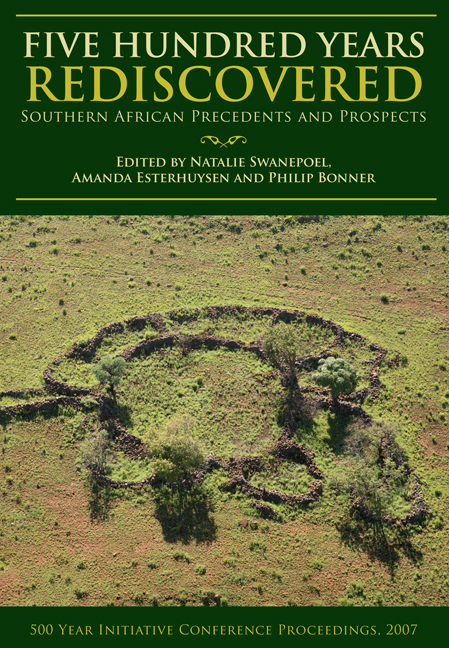Book contents
- Frontmatter
- Contents
- Preface
- 1 Introduction
- Section 1 Disciplinary Identities: Methodological Considerations
- Section 2 Material Identities
- 8 Revisiting Bokoni: populating the stone ruins of the Mpumalanga Escarpment
- 9 The Mpumalanga Escarpment settlements: some answers, many questions
- 10 Post-European contact glass beads from the southern African interior: a tentative look at trade, consumption and identities
- 11 Ceramic alliances: pottery and the history of the Kekana Ndebele in the old Transvaal
- Section 3 ‘Troubled Times’: Warfare, State Formation and Migration in the Interior
- List of contributors
- Index
9 - The Mpumalanga Escarpment settlements: some answers, many questions
from Section 2 - Material Identities
Published online by Cambridge University Press: 30 May 2019
- Frontmatter
- Contents
- Preface
- 1 Introduction
- Section 1 Disciplinary Identities: Methodological Considerations
- Section 2 Material Identities
- 8 Revisiting Bokoni: populating the stone ruins of the Mpumalanga Escarpment
- 9 The Mpumalanga Escarpment settlements: some answers, many questions
- 10 Post-European contact glass beads from the southern African interior: a tentative look at trade, consumption and identities
- 11 Ceramic alliances: pottery and the history of the Kekana Ndebele in the old Transvaal
- Section 3 ‘Troubled Times’: Warfare, State Formation and Migration in the Interior
- List of contributors
- Index
Summary
Introduction
A dense area of precolonial stone ruins extends in a broad band along the escarpment which separates Lowveld from Highveld in Mpumalanga Province (formerly the eastern Transvaal). Although these ruins have been known archaeologically for many decades they have received relatively little sustained attention. The intention of this paper is therefore to draw attention to the enormous research potential of these settlements, and to propose some as yet untried lines of enquiry that could be followed in future projects. I have adopted this approach because, on the one hand, these settlements arguably provide the most detailed and interesting archaeological footprint of any precolonial farming society in South Africa, and on the other, they have seen surprisingly little serious research. In view of the current renewed interest in the period of the last 500 years, with its multidisciplinary initiative, now is an appropriate moment for a reassessment.
The paper consists of three components. The first is a summary of the existing published information which provides a broad, though rather shallow, context for these settlements. The second allows me to place on record some bits of previously unpublished work arising out of my own interest in the area over several decades, though never amounting to a full research project. These two provide the ‘some answers’ of the title. Arising out of them I put forward some ideas towards a different framework of interpretation, which poses possible questions for future research. Hence the answers before the questions, as signalled in the title.
What to call these settlements?
In his thesis, Collett (1982) proposed the name Marateng for the style of pottery associated with these settlements. Marateng is the local name for a mountain in the Badfontein area and is therefore entirely appropriate. I therefore adopted it for my work on the Mpumalanga Escarpment sites, extending its usage to cover not just the ceramics but the whole cultural package including the buildings. Used in this sense, Marateng is already in the literature (e.g. Maggs 1995b; Widgren 2004). However, at the 500 Year Research Group conference in May 2007 I became aware that the almost identical name, Maroteng, applies to the ruling lineage of the Pedi people.
- Type
- Chapter
- Information
- Five Hundred Years RediscoveredSouthern African precedents and prospects, pp. 169 - 182Publisher: Wits University PressPrint publication year: 2008



